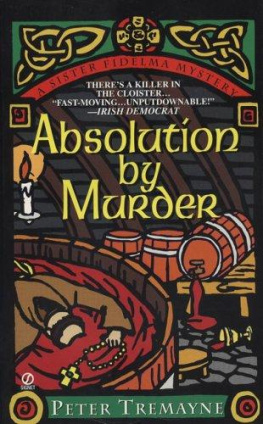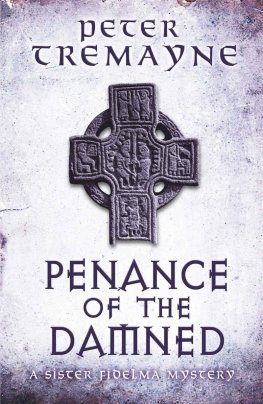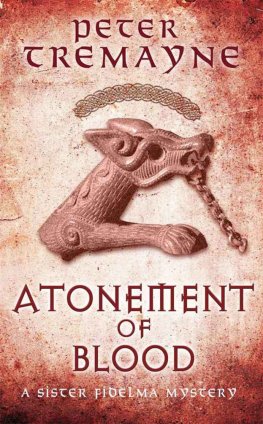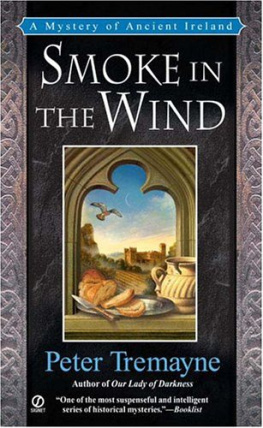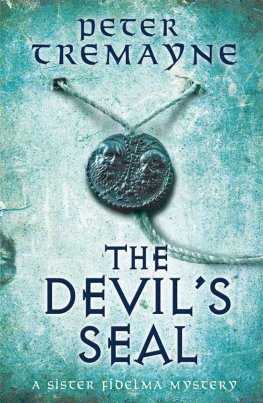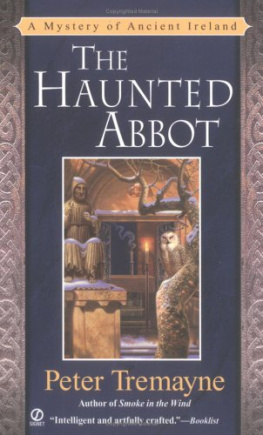Peter Tremayne - Suffer Little Children
Here you can read online Peter Tremayne - Suffer Little Children full text of the book (entire story) in english for free. Download pdf and epub, get meaning, cover and reviews about this ebook. genre: Detective and thriller. Description of the work, (preface) as well as reviews are available. Best literature library LitArk.com created for fans of good reading and offers a wide selection of genres:
Romance novel
Science fiction
Adventure
Detective
Science
History
Home and family
Prose
Art
Politics
Computer
Non-fiction
Religion
Business
Children
Humor
Choose a favorite category and find really read worthwhile books. Enjoy immersion in the world of imagination, feel the emotions of the characters or learn something new for yourself, make an fascinating discovery.

- Book:Suffer Little Children
- Author:
- Genre:
- Rating:5 / 5
- Favourites:Add to favourites
- Your mark:
- 100
- 1
- 2
- 3
- 4
- 5
Suffer Little Children: summary, description and annotation
We offer to read an annotation, description, summary or preface (depends on what the author of the book "Suffer Little Children" wrote himself). If you haven't found the necessary information about the book — write in the comments, we will try to find it.
Suffer Little Children — read online for free the complete book (whole text) full work
Below is the text of the book, divided by pages. System saving the place of the last page read, allows you to conveniently read the book "Suffer Little Children" online for free, without having to search again every time where you left off. Put a bookmark, and you can go to the page where you finished reading at any time.
Font size:
Interval:
Bookmark:
Peter Tremayne
Suffer Little Children
Chapter One
The storm broke with sudden violence. The white flash of lightning heralded a crash of angry thunder. A moment later the rain began to fall in heavy, icy droplets.
The horse and rider had just emerged from the shelter of a forest and halted on a ridge overlooking a broad, low level plain. The rider was a woman, clad in a long, brown woollen cloak and hood, thick and warm, wrapping her body against the late autumnal chill. She turned her gaze to the sky, unafraid of the frenzy of the tempest. The clouds were dark grey, rolling close to the ground and obscuring the distant mountain tops like a mist. Here and there, against this background, were patches of darker, scudding clouds, black and ominous, bringing the threatening thunder with them.
The woman blinked as the cold rain splattered against her face; it was chilly to the point of being painful. Her face was youthful, attractive without being pretty, and with rebellious strands of red hair streaking from under the hood of her cloak across her broad forehead. There was a faint hint of freckles on the pale skin. The eyes seemed momentarily grey, reflecting the colour of the sombre skies, yet when the lightning flashed there was a hint of green fire in them. She sat her horse with a youthful agility, her tall figure firmly in control of the restless animal. A closer examination would have revealed the silver crucifix hung around her neck and the habit of a religieuse hidden by the heavy riding cloak and hood.
Sister Fidelma, of the community of the Blessed Brigid of Kildare, had been expecting the approach of the storm for some hours now and was not surprised by its apparent sudden eruption. The signs had been there for a while. She had observed the closed pine cones on the trees, the withdrawn petals of the daisies and dandelions and the swelling stems of the meadow trefoil, as she rode along. All spoke of the coming rain to her keen, observing eye. Even the last of the swallows, preparing to disappear from the skies of ireann for the winter months, had been keeping close to the ground; a sure indication of the tempest to come. If further indications were necessary, as she had been passing a woodsmans cabin, in the forest behind her, she had seen the smoke of the cabin fire descending instead of spiralling upwards; descending and causing small eddies around the building before dispersing into the cold air. Smoke behaving in such a manner, she knew from experience, was invariably an indication of rains to come.
She was fully prepared for the storm, though not its ferocity. As she halted a moment or two, she wondered whether to return into the forest and seek shelter there until the gusting rains had abated. But she was only a few miles from her destination and the urgency of the message she had received, to come with all speed, made her dig her heels into the sides of her horse and urge it forward down the track leading onto the great plain towards the distant hill that was just visible in spite of the driving rain and darkness of the sky.
This spectacular mound was her objective; a large outcrop of limestone rock rising over two hundred feet to dominate the plain in every direction. It rose in precipitous fashion and now and then the lightning would silhouette it. Fidelma found a constriction in her throat as she gazed on its familiar contours. She could see the fortified buildings which commanded the natural stronghold Cashel, seat of the kings of Muman, the largest of the five kingdoms of ireann. It was the place of her birth and her childhood.
As she rode forward, head bowed into the teeth of the wild, gusty wind, which drove the soaking rain at her, she felt a curious mixture of emotions. She felt an excited pleasure at the idea of seeing her brother, Colg, after several years of absence but she also experienced anxiety as to why he should have sent her a message requesting her to leave her community at Kildare and hasten to Cashel as a matter of urgency.
All through her journey, questions assailed her mind, even though she could not possibly answer them. She had rebuked herself several times for wasting time and emotional energy on the matter. Fidelma had been raised in an old discipline. She found herself remembering the advice of her former master, the Brehon Morann of Tara: Do not place eggs on the table before you have visited the hen. It was no use worrying about the answer to the problem before she knew the questions that she must ask.
Instead, she tried to clear her mind of such worries and sought refuge in the art of the dercad, the act of meditation, by which countless generations of Irish mystics had achieved the state of sitchin or peace, calming extraneous thought and mental irritations. She was a regular practitioner of this ancient art in times of stress although some members of the Faith, such as Ultan, the archbishop of Armagh, denounced its usage as a pagan art because it had been practised by the Druids. Even the Blessed Patrick himself, a Briton who had been prominent in establishing the Faith in the five kingdoms two centuries before, had expressly forbade some of the meditative arts of self-enlightenment. However, the dercad, while frowned upon, was not yet forbidden. It was a means of relaxing and calming the riot of thoughts within a troubled mind.
In such fashion did her journey through the blustery rains, with the continuous crash of thunder and flashes of white lightning, draw Fidelma nearer to the fortress of the kings of Muman. She reached the edge of the township almost before she realised it.
Around the foot of the limestone outcrop, under the shadow of the fortress, a large market town had slowly arisen over the centuries. The day had now darkened considerably as the storm continued unabated. Fidelma reached the entrance of the town and began to guide her horse into the narrow streets. She could smell the pungent odour of turf fires and see, here and there, the dim light from numerous flickering lanterns. Suddenly, out of the dark shadows, a tall warrior, holding a lantern aloft in one hand, a spear loosely but professionally held in his shield hand, challenged her entrance.
Who are you and what business have you here in Cashel?
Sister Fidelma drew rein on her horse.
I am Fidelma of Kildare, she replied, her voice loud in order to be heard against the noise of the storm. Then she decided to correct herself. I am Fidelma, sister of Colg.
The warrior let out a low whistle and stiffened slightly.
Pass in safety, lady. We were told to expect your coming.
He withdrew back into the shadows to continue his uncomfortable task as a sentinel against the dangers of the night.
Fidelma guided her horse through the dark, narrow streets of the township. Her ears picked up the sound of occasional laughter and lively music coming from some of the buildings as she rode by. She crossed the town square and started towards the track which wound up to the top of the rocky hill. It had been occupied since time immemorial. Fidelmas ancestors, the oganachta, the sons of Eoghan, had settled there over three hundred years ago when they claimed the kingship of Muman for their own, making the rock into their political, and later ecclesiastical, centre.
Fidelma knew every inch of it for her father, Failbe Fland, had once been king of Cashel.
Do not go further! screeched a thin, reedy voice, rousing Fidelma abruptly from her revelry.
Fidelma halted sharply and stared down in surprise at the shapeless figure which had leapt out in front of her horse to barthe way. Only by the voice did Fidelma realise that the mess of furs and rags was a woman. The figure crouched, drenched by the rain and leaning heavily on a stick. Fidelma peered closely but could not discern the womans features. That she was old was obvious but all was obscured save, by the lightnings illumination, the glimpse of white, rain-soaked hair, plastered to her face.
Font size:
Interval:
Bookmark:
Similar books «Suffer Little Children»
Look at similar books to Suffer Little Children. We have selected literature similar in name and meaning in the hope of providing readers with more options to find new, interesting, not yet read works.
Discussion, reviews of the book Suffer Little Children and just readers' own opinions. Leave your comments, write what you think about the work, its meaning or the main characters. Specify what exactly you liked and what you didn't like, and why you think so.

